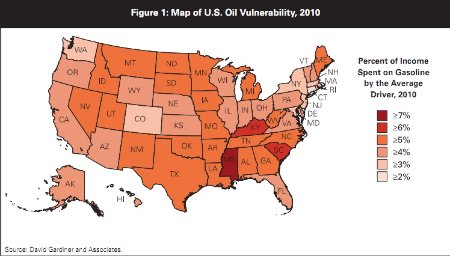 A breakdown of which states are most vulnerable to rising gas prices (GOOD)It’s a bird, it’s a plane, it’s superbugs!
A breakdown of which states are most vulnerable to rising gas prices (GOOD)It’s a bird, it’s a plane, it’s superbugs!
Overuse of drugs, like penicillin and tetracycline, in raising livestock has led to the emergence of “superbugs,” drug-resistant bacteria that’s claiming more human and animal lives each year. In response, the Natural Resources Defense Council, Center for Science in the Public interest, Food Animal Concerns Trust, Public Citizen, and the Union of Concerned Scientists filed a joint lawsuit against the FDA to ban low-dose antibiotic use in animal feed. Link
Visualizing our oil addiction
See which states are most vulnerable to rising gas prices in this infographic displaying results from the Natural Resources Defense Council’s annual “Fighting Oil Addiction” report. The report also looks at what states are doing to decrease their oil dependency. Link
Offshore wind projects stalled
What was a race to build the first offshore wind farm has come to a standstill. Bluewater Wind’s project off the coast of Maryland and the Cape Wind project in Massachusetts have been stalled thanks to cuts to the Department of Energy’s loan programs. Link
Making biofuel from garbage
Turning garbage into biofuel is no longer just a sci-fi plot line. With backing from independent oil refiner Valero and trash company Waste Management, the Canadian company Enerkem is opening a commercial-sized plant in Quebec that could generate 1.3 million gallons a year. Another plant is being built in Alberta and, thanks to a $50 million grant and loan guarantee from the U.S. Department of Energy, a third in Tupelo, Miss. Link
CO2 emissions on the rise
Global CO2 emissions rose to unprecedented heights in 2010, reports the International Energy Agency. Even worse, 80 percent of projected emissions in 2020 are already “locked in,” meaning they will come from already built or under construction power plants. Link
What fish are you really eating?
In a report aptly titled “Bait and Switch,” international ocean advocacy group Oceana found that seafood is often mislabeled and sold in stores and restaurants. Oceana has announced a new campaign to fight this seafood fraud and the FDA is planning to implement routine DNA testing by the end of the year. GOOD, NY Times, Washington Post







